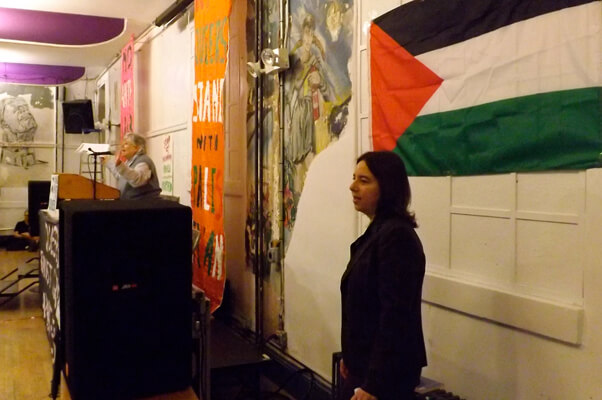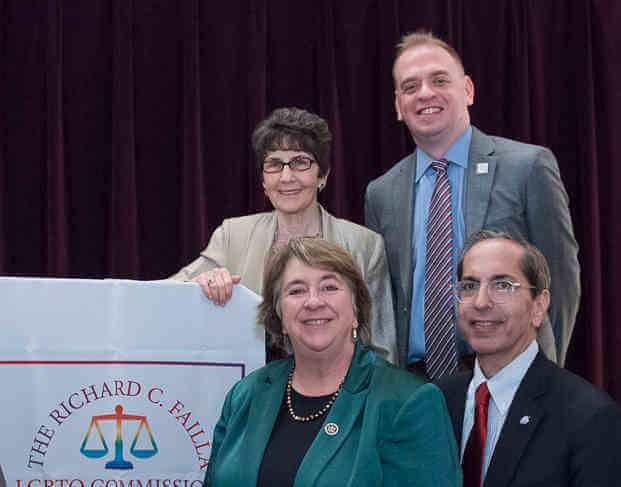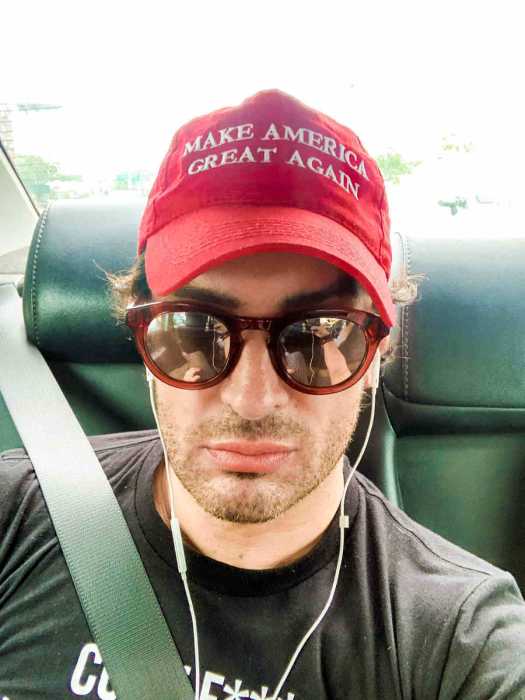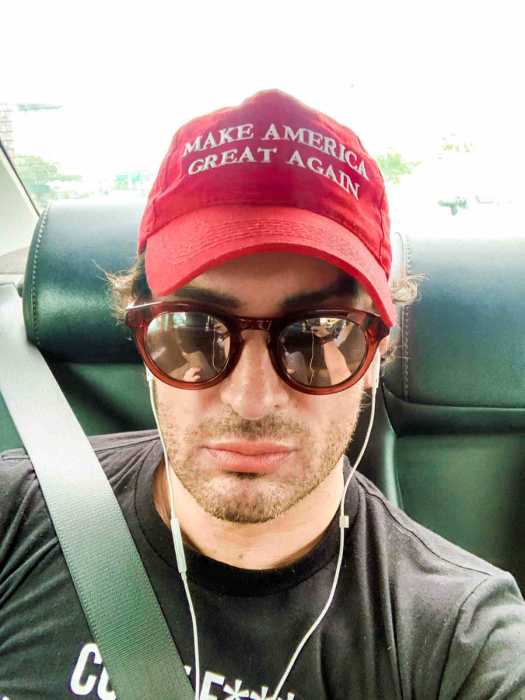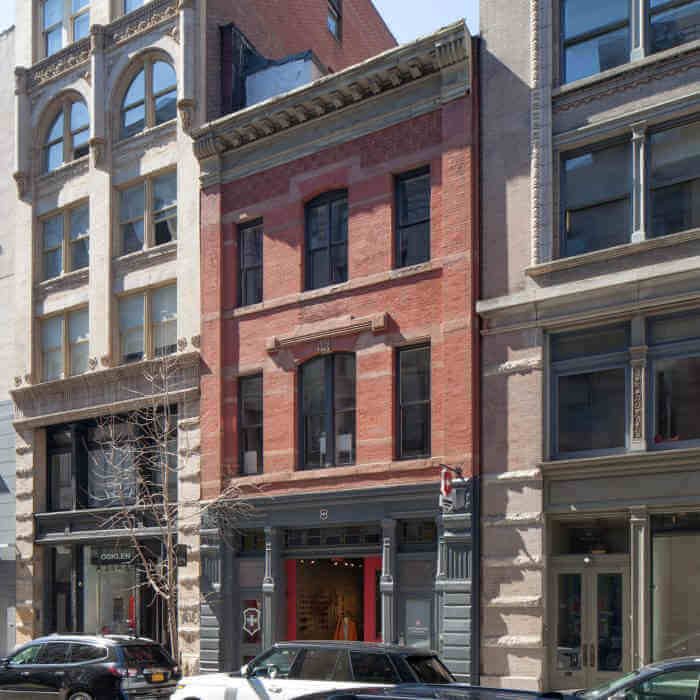Sarah Schulman stands in front of the Palestinian flag as QAIA’s Leslie Cagan introduces her. | GAY CITY NEWS
Roughly two years after the Lesbian, Gay, Bisexual & Transgender Community Center banned groups that “organize around the Israeli-Palestinian conflict,” Queers Against Israeli Apartheid (QAIA) hosted author Sarah Schulman at the West Village building for a reading from her book on that conflict.
“After two years, we are proud to be meeting here in this room, in this building, as Queers Against Israeli Apartheid,” said Leslie Cagan, a QAIA member, as she introduced Schulman on March 11. The ban was lifted on February 15.
About 150 people packed a first floor room at the West 13th Street facility to hear Schulman speak. With questions, the event lasted nearly two hours. The crowd was almost entirely in agreement with Schulman and QAIA, a group that opposes Israeli government policy on Palestine.
Author and academic appears before large, mostly friendly crowd, but some critics too
Schulman read from “Israel/ Palestine and The Queer International” and discussed her evolution from a longtime progressive activist who had not considered Israeli government policies to one who now supports the Boycott, Divestment, and Sanctions (BDS) movement against Israel.
“I managed to avoid the situation in Israel and I managed to avoid it for a long time,” Schulman said.
She first confronted those policies in 2009 after being asked to speak at an academic conference in Tel Aviv.
“I was all ready to go and a colleague of mine, a Turkish Jew, said ‘Well, you know there’s a boycott,’” Schulman said. “I didn’t see how a lesbian and gay studies conference could be part of a boycott.”
After consulting with colleagues, notably Judith Butler, a professor at the University of California at Berkeley, Schulman decided to support what then was a boycott of the “academic and cultural” institutions in Israel “that normalize the occupation.”
But she did travel to Israel where she ended up speaking to some of the people who organized the conference and others who would have attended.
“I realized I could boycott and communicate with people,” Schulman said. As the City University of New York professor walked through Bil’in, a West bank village, with activists, Israeli soldiers fired tear gas at them and Schulman asked herself “Who is we? Who is we and they? These soldiers were not we.”
The “we” are those who support “equal rights” and “self determination,” Schulman said, while the “they” do not. Israeli government policy and its supporters are likened to South Africa’s apartheid policy and its proponents by the BDS movement.
“Their whole argument is about racial supremacy,” Schulman said.
Schulman was cautious. Recalling that some on the gay left had supported the Cuban government at a time when queers there were “profoundly oppressed,” she met with Palestinian activist Omar Barghouti, a leading voice in the BDS movement.
“He was really uptight,” Schulman said. “I was really uptight… I thought it went horribly.”
Back in America, Schulman organized a six-city tour of Palestinian queers who supported the BDS movement that was well received here.
“They went back home and who supported them?,” Schulman asked. Several audience members correctly answered, “Omar.”
The Center’s ban came in 2011. The facility had rented space to Siege Busters Working Group, an organization challenging the Israeli naval blockade of the Gaza Strip. When Siege Busters sought space for a party, it was banned because it was “an incredibly controversial and contentious event” and “it was not LGBT focused,” Glennda Testone, the Center’s executive director, said at a 2011 town hall meeting.
The Center then permitted QAIA to rent space for three meetings, but abruptly banned that group after one meeting and announced an “indefinite moratorium” on renting to groups that “organize around the Israeli-Palestinian conflict.”
Earlier this year, QAIA asked to rent space to have Schulman read from her book and was denied. That prompted a ferocious outcry and the Center lifted the moratorium.
But the ban’s end did not end any controversy over the Israeli-Palestinian conflict. During questions, one man took up Schulman’s theme and asked “Is Hamas part of the ‘they?’”
Hamas, an Islamic group, is the elected government in the Gaza Strip and homosexuality is a crime there. No queer Palestinian groups are known to have offices or even operations in the Gaza Strip.
“It depends,” Schulman said. “I don’t know enough about Hamas.”
A second man won scattered applause when he said Schulman had given a “disingenuous answer” to the Hamas question.
Pinkwashing was also raised. Activists say that practice promotes Israel’s pro-gay policies as a form of misdirection to distract from the government’s more objectionable policies.
“Gay Pride in Tel Aviv is emblematic of modernity,” Schulman said. “The idea is that if they have Gay Pride in Tel Aviv, the occupation doesn’t matter.”
Jayson Littman, a party promoter and “gay Zionist,” said that Schulman was engaged in her own spin by soft pedaling Palestinian violence.
“You’re pretty much pinkwashing in the same way,” he said.
Schulman asked members of a queer Palestinian group who attended the event to answer Littman’s point.
“I was pleased that she called on me,” Littman told Gay City News after the event. “I was disappointed that she didn’t answer the question.”

